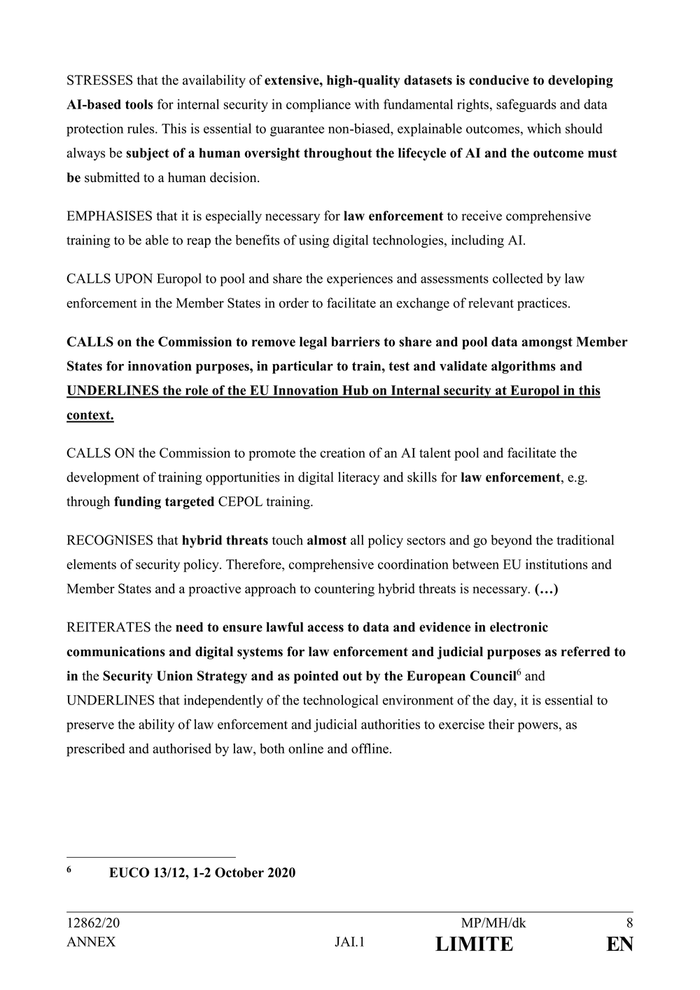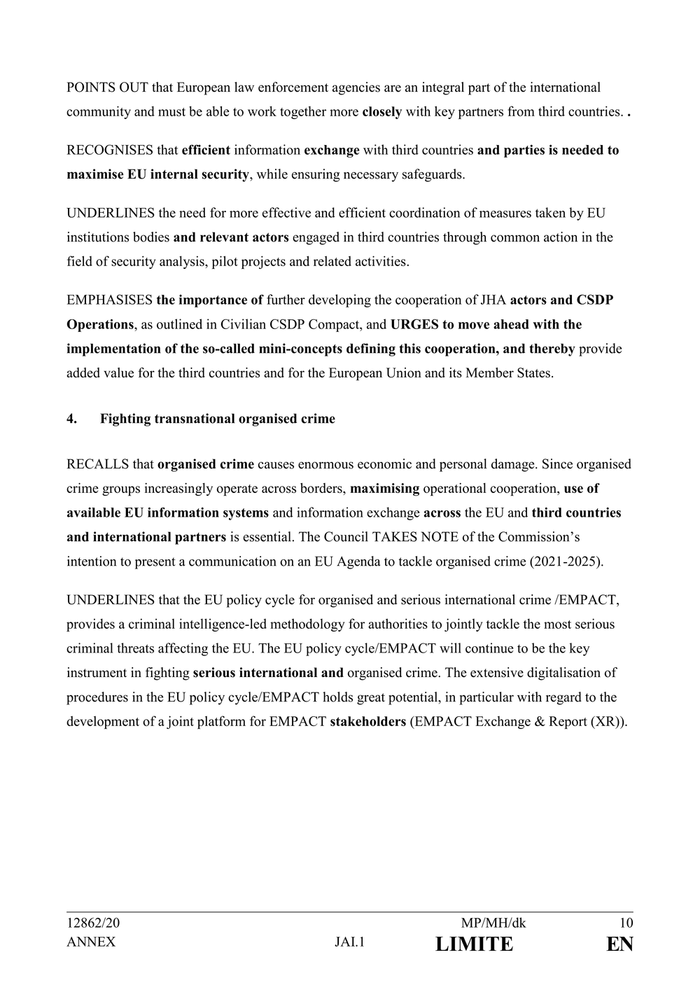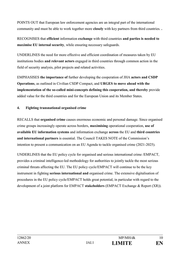st12862.en20
Dieses Dokument ist Teil der Anfrage „COSI and CATS documents in 2020“
Council of the European Union Brussels, 16 November 2020 (OR. en) 12862/20 LIMITE COSI 203 CATS 85 ENFOPOL 303 DROIPEN 101 ENFOCUSTOM 129 COPEN 320 IXIM 114 COPS 398 CT 104 HYBRID 34 CRIMORG 108 DISINFO 36 CYBER 230 DIGIT 121 CORDROGUE 69 JAI 972 NOTE From: Presidency To: Delegations No. prev. doc.: 11518/2/20 REV 2, 11516/3/20 REV 3 Subject: Draft Council Conclusions on Internal Security and European Police Partnership Delegations will find attached in the Annex a revised version of the above draft Council 1 conclusions , further to the VTC meeting of COSI SG on 10 November 2020 and taking into account the written comments submitted by delegations. 1 Changes compared to the previous version are marked in bold underlined and strikethrough. 12862/20 MP/MH/dk 1 JAI.1 LIMITE EN

ANNEX DRAFT COUNCIL CONCLUSIONS on Internal Security and European Police Partnership THE COUNCIL WELCOMES the Commission’s communication on the EU Security Union Strategy 2 setting out specific actions which aim to address strategic priorities in both the digital and the physical worlds in an integrated manner for the period 2021 – 2025, while building on the previous work of the Council ,3 and UNDERLINES the importance of Security Union reports as a tool to monitor progress and assess gaps and emerging threats. POINTS OUT that significant progress on cooperation in the field of internal security across the Union has been achieved in recent decades and that the principle of availability of information for data exchange as already laid down in the Hague Programme, the improvement of legislation and tools for sharing information, and the setting of a common standard of data protection have been major steps in fostering cooperation between European law enforcement authorities. WELCOMES the trio Presidency (DE-PT-SI) program and coordination regarding new initiatives enhancing the internal security and related to the new EU Security Union Strategy. RECALLS that the previous trio presidency substantially advanced the discussion on the future of EU internal security policy, with an emphasis on the need to consolidate resources, share experience and expertise, and enhance the coordination of policing throughout the European Union to respond to evolving security challenges and harness the potential of technological developments. 2 10010/20. 3 Future of internal security debates ( Presidency report on outcome of discussions, 14297/19) 12862/20 MP/MH/dk 2 ANNEX JAI.1 LIMITE EN

ACKNOWLEDGES the recent discussions in the JHA 4 Council , (…) which bring a new impetus to developing a European Police Partnership to reinforce the existing cooperation. AGREES in particular that in a strengthened European (…) partnership for internal security, information, necessary to perform his or her duties, should be made available to any law enforcement officer in every Member State, from any other Member State, in accordance with applicable law. REITERATES the principle of availability of information and REAFFIRMS that even though the common European data protection framework and various legal and technical instruments have already made it easier to connect existing information, there is still room for improvement. AGREES that a strengthened European Partnership for internal security needs continuous improvement of information management and optimisation of the use of existing instruments and agreements for information exchange UNDERLINES, with regard to enhancing internal security, that technical progress and digital transformation call for appropriate new solutions and approaches for the security authorities. CONDEMNS the heinous terrorist attacks that recently took place in Austria, Germany and France. These attacks were an assault on the European values, fundamental rights and, eventually, our way of life. Our European partnership for internal security will ensure effective operational cooperation and cross-border investigation, also regarding preventing and tackling violent extremism and terrorism, irrespective of its origin. 4 WK 10468/2020 12862/20 MP/MH/dk 3 ANNEX JAI.1 LIMITE EN

I. Milestones for the establishment of an effective European partnership for internal security (2020 – 2025) Against this background, the Council: REITERATES the following political priorities for the coming years and STRESSES in particular that these milestones should be achieved by joint action by Parliament, Commission, Member States and the relevant JHA agencies between now and 2025 to support the functioning of the area of freedom, security and justice and to establish an effective European (…) partnership for internal security: • information, necessary to perform his or her duties, should be made available to any law enforcement officer in every Member State, from any other Member State, in accordance with applicable law. • The EU and the Member States have implemented technical solutions for law enforcement authorities to communicate with each other securely and confidentially. • Full use of the instruments for EU-wide alerts for criminal acts is standard practice, e.g. the Schengen Information System alerts for persons or objects. • Our common data protection framework and numerous legal and technical instruments allow us to better connect the information we already have. The EU’s information architecture follows the principle of availability even more closely. The Prüm framework is reviewed and updated, where appropriate (…). • A (…) modern and upgraded acquis on cross-border police cooperation is established in order, for example, to provide adequate powers for cross-border surveillance and hot pursuit. • Law enforcement authorities are able to use (…) artificial intelligence technologies in their daily work, subject to clear safeguards. • Law enforcement authorities of the Member States and Europol are equipped to work more intensively and share information with third countries. 12862/20 MP/MH/dk 4 ANNEX JAI.1 LIMITE EN

• Law enforcement agencies are able to work with public and private partners worldwide, subject to a clear safeguards framework, and in particular have access to the necessary information to counter serious crime and violent extremism and terrorism exploiting the internet (…) II. Way forward 1. Strengthening European law enforcement cooperation ACKNOWLEDGES that the European dimension of law enforcement cooperation needs to be strengthened. In general, more awareness of the information needs of European partners is required in daily work routines. Whenever there is a national alert, EU-wide alerts in the Schengen Information System (SIS) should become a standard practice in compliance with the applicable legal framework. UNDERLINES that the COVID-19 pandemic has shown the importance of secure communication channels. Thus, the Council urges Member States, EU JHA agencies and the Commission, while building on already existing mechanisms and networks (such as SIENA), to further develop technical solutions for secure and confidential communication between EU law enforcement authorities. HIGHLIGHTS the fact that the EU JHA agencies, e.g. Europol, Frontex, eu-LISA, Eurojust and CEPOL are cornerstones of the European security architecture, and thus REITERATES that providing appropriate funding and staff to these agencies is indispensable. In addition, international organisations and bodies, such as Interpol are essential partners for EU security. UNDERLINES the key role and the future direction of Europol, as stated in the Council 5 Resolution on the Future of Europol of 9 November 2020 . 5 12463/20. 12862/20 MP/MH/dk 5 ANNEX JAI.1 LIMITE EN

RECALLS that the implementation of the new Frontex Regulation in general and the deployment of the Frontex Standing Corps are crucial for further development of law enforcement cooperation within the European security landscape, and thus URGES Frontex and Member States to fulfil their legally binding share. CALLS UPON Member States to make full use of the existing instruments for sharing information, e.g. the SIS, Europol, as well as Interpol databases and to remove obstacles to their efficient implementation. CALLS ON all Member States to make use of the existing instruments to their full potential and to advance the exchange of relevant information of the highest possible quality. Member States, together with the responsible EU agencies, foremost eu-LISA, Europol and Frontex, must swiftly implement the adopted legal framework for the revised JHA information architecture to achieve the interoperability of EU information systems for borders, migration and security. REQUESTS that the Commission present a legislative proposal for the further development of the Prüm framework. The possible extension to/introduction of other information categories, e.g European Police Records Index System (EPRIS) could be considered in this context. REFERS to the conclusions on enhancing cross-border law enforcement cooperation in Annex 1 and POINTS OUT the importance of establishing more effective law enforcement cooperation between Member States and their respective agencies, in particular along the cross-border areas. EMPHASISES the need to take all necessary steps to further strengthen operational cross-border cooperation by effectively implementing existing instruments and, where appropriate, by enhancing, consolidating and simplifying the legal foundations in order to keep the European Union safe, and HIGHLIGHTS the value and success of local, regional and bi- or trilateral law enforcement cooperation (…) 12862/20 MP/MH/dk 6 ANNEX JAI.1 LIMITE EN

2. Shaping the future and keeping pace with technological progress RECOGNISES that while digital transformation and the use of new technologies, in particular artificial intelligence (AI) is having a profound impact on all spheres of people’s lives, it enhances our capabilities to protect the common values in our societies. The use of AI by law enforcement authorities can potentially facilitate and improve the provision of security and the prevention, investigation and prosecution of crime throughout the EU. Digital tools can facilitate the gathering of evidence by better structuring datasets and information, discern patterns, detect links, identify victims and perpetrators as well as the location of the offence, automate and accelerate the handling of standardised and uniform tasks, and help to analyse trends and forecast risks and threats in order to prevent criminal activities thereby increasing the speed and effectiveness of law enforcement. At the same time, the use of these tools will reduce costs and can limit the negative psychological impact that stressful material such as images of sexual abuse or hate crime may have on law enforcement personnel. STRESSES that using AI is likely to aid in the identification of new, previously unknown patterns and modi operandi, especially in the fields of terrorism, cybercrime, sexual abuse of children, trafficking in human beings, drug-related crime and economic crime. Therefore, law enforcement in the Member States should use AI to enhance prevention and facilitate investigation, as well as to protect the victims of such crimes. REAFFIRMS that the design, development, deployment and evaluation of AI for internal security must be guided by and aligned with fundamental rights and data protection. For AI used by law enforcement, specific fundamental rights requirements arise for the development and the conditions of deployment. To the extent that these systems are to be used, appropriate safeguards are needed to ensure responsible, trustworthy, public-interest-oriented and human-centric development and use of AI applications in the law enforcement sector. Users must adequately understand how AI tools were developed and how they operate, they must be able to explain and demonstrate the results and must have clear knowledge about their impact on individuals, on minorities and on the society as a whole. 12862/20 MP/MH/dk 7 ANNEX JAI.1 LIMITE EN

STRESSES that the availability of extensive, high-quality datasets is conducive to developing AI-based tools for internal security in compliance with fundamental rights, safeguards and data protection rules. This is essential to guarantee non-biased, explainable outcomes, which should always be subject of a human oversight throughout the lifecycle of AI and the outcome must be submitted to a human decision. EMPHASISES that it is especially necessary for law enforcement to receive comprehensive training to be able to reap the benefits of using digital technologies, including AI. CALLS UPON Europol to pool and share the experiences and assessments collected by law enforcement in the Member States in order to facilitate an exchange of relevant practices. CALLS on the Commission to remove legal barriers to share and pool data amongst Member States for innovation purposes, in particular to train, test and validate algorithms and UNDERLINES the role of the EU Innovation Hub on Internal security at Europol in this context. CALLS ON the Commission to promote the creation of an AI talent pool and facilitate the development of training opportunities in digital literacy and skills for law enforcement, e.g. through funding targeted CEPOL training. RECOGNISES that hybrid threats touch almost all policy sectors and go beyond the traditional elements of security policy. Therefore, comprehensive coordination between EU institutions and Member States and a proactive approach to countering hybrid threats is necessary. (…) REITERATES the need to ensure lawful access to data and evidence in electronic communications and digital systems for law enforcement and judicial purposes as referred to 6 in the Security Union Strategy and as pointed out by the European Council and UNDERLINES that independently of the technological environment of the day, it is essential to preserve the ability of law enforcement and judicial authorities to exercise their powers, as prescribed and authorised by law, both online and offline. 6 EUCO 13/12, 1-2 October 2020 12862/20 MP/MH/dk 8 ANNEX JAI.1 LIMITE EN

UNDERLINES that encryption is an anchor of confidence in digitalisation and should be promoted and developed. Encryption is a means of protecting privacy as well as the digital security of governments, industry and society. At the same time, lawful access for law enforcement and judicial purposes must be ensured. As stated in the Council Resolution on 7 encryption , any action taken has to balance these interests carefully, while seeking technical solutions for lawful access to encrypted data in a close dialogue with the technological industry and academia. RECALLS the need for a balanced framework for (…) data retention, which effectively allows access to the information needed to combat serious crime, as well as the swift adoption of legislation on access to cross-border electronic evidence. 3. Global challenges and international cooperation in the area of security UNDERLINES the need to deepen cooperation and sharing of information with (…) third countries under appropriate safeguards , in the field of law enforcement (…) , as such cooperation is closely linked to the wider security interests of the Union. EMPHASISES the need to further promote the EU’s security and border management partnership in the form of more operational cooperation between Frontex and third countries and SUPPORTS bi- and multilateral initiatives of Member States to enhance operational coordination with third countries. RECALLS that existing status agreements need to be adapted to the new Frontex Regulation. Pending status agreements, in particular with the Western Balkan partners, should be signed and enter into force as soon as possible. The reinforcement of operational cooperation in the area of internal security with other third countries, whether neighbouring the EU or not, should be assessed by the Commission in close cooperation with all actors involved. 7 Reference to be added. 12862/20 MP/MH/dk 9 ANNEX JAI.1 LIMITE EN

POINTS OUT that European law enforcement agencies are an integral part of the international community and must be able to work together more closely with key partners from third countries. . RECOGNISES that efficient information exchange with third countries and parties is needed to maximise EU internal security, while ensuring necessary safeguards. UNDERLINES the need for more effective and efficient coordination of measures taken by EU institutions bodies and relevant actors engaged in third countries through common action in the field of security analysis, pilot projects and related activities. EMPHASISES the importance of further developing the cooperation of JHA actors and CSDP Operations, as outlined in Civilian CSDP Compact, and URGES to move ahead with the implementation of the so-called mini-concepts defining this cooperation, and thereby provide added value for the third countries and for the European Union and its Member States. 4. Fighting transnational organised crime RECALLS that organised crime causes enormous economic and personal damage. Since organised crime groups increasingly operate across borders, maximising operational cooperation, use of available EU information systems and information exchange across the EU and third countries and international partners is essential. The Council TAKES NOTE of the Commission’s intention to present a communication on an EU Agenda to tackle organised crime (2021-2025). UNDERLINES that the EU policy cycle for organised and serious international crime /EMPACT, provides a criminal intelligence-led methodology for authorities to jointly tackle the most serious criminal threats affecting the EU. The EU policy cycle/EMPACT will continue to be the key instrument in fighting serious international and organised crime. The extensive digitalisation of procedures in the EU policy cycle/EMPACT holds great potential, in particular with regard to the development of a joint platform for EMPACT stakeholders (EMPACT Exchange & Report (XR)). 12862/20 MP/MH/dk 10 ANNEX JAI.1 LIMITE EN










